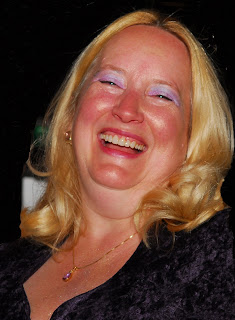********************************************************************************
Several years ago when DD1 was in the Dutch equivalent of first grade, her class got involved in a project to help "Save the Environment" and each child came home with a contract that they were to sign that committed them and their family to doing one extra thing for a whole month to reduce the amount of waste that their family contributes to the environment. While this sounds like a great principle, it created a major dilemma for us as we were already doing almost everything we could to reduce the amount of waste we generate. The contract came with a few simple examples that we had already been following for years:
- Paper recycling - including the brochures and free newspapers, old envelopes, receipts and financial papers that have been shredded, etc. We even took this a step further and re-used gift wrap at least once before putting it in the old-paper bin for recycling. And already for 2 years we had been supplying the school with "scrap paper" for drawing, etc. as my husband collected the cover-sheets from computer printouts at work which had only 3 lines on one side of the paper!
- Glass recycling - food jars, wine bottles, cosmetics containers, etc. Again, we had been doing that for years. And taken it even further by re-using glass jars for leftover sauces and condiments in the fridge. And I had the previous month supplied the school with 2 dozen small jars of similar size and shape for use in one of their art projects!
- Composting - putting coffee grounds, potato peels, banana skins, with leaves and grass cuttings to be decomposed and used on the garden. In our village, every other week the "brown bin" is collected where all the decomposable waste can be put in. And every summer there is an announcement telling the families when they can pick up their 2 free bags of fully decomposed compost mulch for use in their gardens. We have always been very conscious about what we put in the compost bin and this container is usually fuller than the regular trash bin collected on the alternate weeks.
- Clothes and textile recycling - at various locations there are containers that accept clothes, shoes, linens, etc that are re-used, recycled or turned into rags. First of all, our family is a big proponent of hand-me-downs. My kids grew up loving to get clothes their cousin or older friends had worn. And when they were small, I shopped the second-hand stores for many of their jeans, jackets and playtime wear. And I have never thrown any item of clothing away if it could potentially be re-used by someone. Even old sheets and dishtowels become rags and floor clothes. And I have a pile of jeans and T-shirts that are used for patching knees and will eventually become a quilt (following my grandmother's tradition). The final stop for any clothes that cannot really be re-used is the recycle container where they can be turned into rags or filler.
- Books - Holland has a number of second-hand stores that accept books. Books that are damaged can also be put in the old paper recycling containers. You should realize I have trouble parting with any of my books and my children have inherited this pack-rat tendency. And I am very familiar with the local second-hand bookstores as I shop there regularly and have on occasion also sold them books. In other words, we do not throw away books. We even pass magazines on to friends and others we share with the school for use in their crafts.
- Toys - Many playthings are that are still in good condition can be donated to charity organizations for re-sale. Again, been there, done that. In fact, I am greeted by name at the local toy re-sale shop. The love getting the US toys and English language books as it offers something different they can sell in their shop!
And we have always been very careful about chemical waste. Used batteries are stored for when the "Chemical Car" comes to collect about once every two months. This vehicle, operated by the village, also collects any old household rest products such as paint, cleaning fluid, insecticides, aerosol spay cans, old medicines, and small electrical appliances and disposes of them responsibly. We have always used re-chargeable batteries or used an adapter instead of disposable batteries. And vinegar is one of my favorite cleaning products for cleaning glass and removing grease! Where possible we use CFC light bulbs and we turn off lights and electrical appliances when not in use. We use cloth hand towels instead of paper and coffee mugs instead of disposable cups (even at work!).
We have even adapted our gift-giving as often times there is really nothing we need or want and it is difficult to find something to send overseas friends and family. So instead we have a number of websites (listed here) where we can give to a charity in someone's name and they will receive a card describing their gift and how it helps. DD1 loved "adopting" a dolphin one year. One of my favorite gifts from my last birthday was a goat!
In other words, we have always been a very ecologically conscious family and have adapted our lifestyle as far as possible to try and live what we believe in. So when this project came along, it created a major drama (appropriate for S.O.S.) in our family to try and come up with something more we could do to meet the requirements of the contract our daughter wanted to sign and set a good example for her. She was in floods of tears at the thought of being the only one who could not put down something on the contract and my explanation that we were probably the most ecologically-minded family at the entire school did nothing to comfort her! Finally a search on the internet turned up a new (old) idea: re-using eggshells! My husband then remembered his grandmother used to do this!
Almost every Sunday, we each have one or two eggs. And until then we had been putting the eggshells in the brown bin with the other compost. But I read that eggshells were a good way of adding a natural calcium fertilizer to the soil, and this was a good way to help prevent the moss from growing in the garden. All you need to do is dry the eggshells and grind them down to a fairly fine powder...
So this was our solution. We bought a small metal mortar and pestle and it became DD1's task to grind up the shells for use in the garden. Our solution was well-received by her teacher and classmates and in later years when she was in the throes of the "Harry Potter" craze she referred to this task as her "Potions" homework! And we have noticed a significant reduction of moss in our garden!
It's not a big thing, but it is one more small thing that allowed us to need less fertilizer for the grass and still have a nice lawn. And it made my daughter happy! But Kermit did know what he was talking about with the song "It's Not Easy Being Green..."!
I hope I have in some small way helped you to think about the environment and ways you too can "Reduce your footprint"! And I wish you all a great S.O.S. and Blog Action Day!




13 comments:
I'd never heard of Blog Action Day - neat idea!
What a terrific way of combining two posts! How resourceful of you.
And you are probably one of the most ecology-minded families I have ever heard of. WOW!
Okay.
1) I want your village to move to my town
2) You are my new eco-hero
3) Yay for eggshells!! We have LOADS of moss!
I love that you incorporated these two things! Good on you, fellow blogger. You've opened my eyes to a few things that I can do. I'm always looking for ways to improve. :D
You are inspiring! I've been trying to talk my husband into using eggshells for our tomatos for the past year. Next year, we're GOING to do it!
FA, I thought WE were eco-conscious until I read this post. You are an inspiration on so many levels. Great job!
Thanks for the ideas. I'm working on pulling myself together so I can do more. Unfortunately, no curbside recycling here, so I'm still trying to figure out how to do it.
Wow, babe! This is incredible! I'm so completely and totally impressed. There are SO many areas in which my little family can be better.
FA, you are a great Green example! Wow!
I can stand and bear witness to all of these things you do FA. If I'd had the time, I would have posted a tribute to your very greenness and told the story (which I have never told you) of what happened when we tried so diligently to follow in your footsteps the summer we lived at your place. Alas, another blog, another day...
But you my darling, completely ROCK. You are the greenest of the green heroes.
Great post.
This is wonderful, FA, because we also get so many hints about things we can do to be greener. I envy you the brown car and the battery car. We could sure use those here. We do compost on our own and recycle the batteries, but there are only two times a year you can drop off batteries and the lines are ridiculous (2 hours long once).
Thanks so much for all the encouragement my dear blogfriends! I know full well how hard it is to live this lifestyle and poor Jenn-in-Holland experienced it firsthand when she house-sat for me one summer! But the real drama (which I thought made it an appropriate SOS) came when we were asked to do more! I just hope this came off as more of an inspiration rather than a brag!
wow, what a list of neat ideas...I am at work right now, but will have to come back to have a more tourough look!
Post a Comment